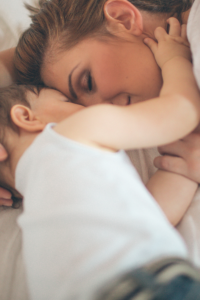Break Free From the Past: How Self-Reflection Transforms Parenting
Updated July 2024

Parenting is a journey filled with both joys and challenges. As we navigate this incredible experience, we often find ourselves seeking guidance and support. One of the most powerful tools available to us is self-reflection. By understanding the influence of our own upbringing, we can unlock our potential to create a happier, more connected family.
Our childhood experiences shape our beliefs, values, and parenting instincts. By reflecting on our past, we can identify the positive influences that shaped us and break free from negative patterns. This self-awareness empowers us to make conscious choices about the kind of parents we want to be and the legacy we want to leave for our children.
5 Ways Reflecting on Your Upbringing Can Transform Your Parenting Journey:

1. Embracing Your Positive Influences
By reflecting on our upbringing, we can identify the positive influences that have shaped us and intentionally pass them on to our children. Remember, positive influences aren’t solely from parents; teachers, mentors, coaches, or even friends might have played a significant role.
Focus on these questions to uncover your positive influences:
- What made you feel loved and supported? How can you replicate those feelings for your own children?
- What made you feel safe and secure? How can you create a similar sense of safety for your children?
- What brought you joy and happiness? How can you incorporate those experiences into your family life?
- What traditions or rituals were important to your family? Do you want to continue these traditions, or create new ones?
- Did you feel a strong sense of connection with your family, teachers, or mentors? What made those relationships special?
- Were there specific experiences or values that nurtured your growth and development?
- How can you recreate those positive feelings and experiences for your own children?
There’s no right or wrong way to approach this reflection. The goal is to identify the aspects of your upbringing that resonate with you and your family’s values. By consciously choosing which elements to carry forward, you can create a positive and intentional parenting experience.
2. Breaking Free from Negative Cycles

Recognizing the patterns and behaviors that didn’t serve us well in our childhood is the first step towards breaking free from those cycles. This journey of self-discovery can be challenging, but it’s essential for creating a positive and intentional parenting experience.
Ask yourself:
- Were there communication patterns or conflict resolution styles that were harmful? How can you approach these situations differently with your children?
- Did you experience emotional neglect or over-involvement? How can you find a healthy balance in your own parenting?
- Were there unrealistic expectations or comparisons placed on you? How can you foster a growth mindset and unconditional love in your children?
- Did you experience any form of abuse or trauma? Seeking professional support can be crucial in healing and breaking these cycles.
Remember, this is a journey of self-discovery and healing. It’s okay to feel uncomfortable or overwhelmed during this process. Be gentle with yourself and celebrate your progress. By understanding the root causes of negative patterns, you can consciously choose to create a different experience for your children.
Guide your self-reflection with the Calm & Connected Workbook. This thought-provoking workbook is an exclusive part of the Calm & Connected Bundle – a powerful 3-step system designed to make positive parenting effortless.
Use Code CALM25 for 25% off for a Limited Time!
3. Cultivating Self-Awareness & Understanding Reactions

Self-awareness is the foundation for responding to our children with empathy and understanding, rather than reacting impulsively. By reflecting on our own triggers and emotional responses, we can choose healthier coping mechanisms and create a calmer, more connected family environment.
To gain a deeper understanding of your triggers and reactions, ask yourself:
- What situations or behaviors consistently push my buttons? Is it whining, defiance, or something else?
- How do I typically respond when I’m feeling overwhelmed or frustrated? Do I yell, withdraw, or use sarcasm?
- What are the underlying emotions driving my reactions? Am I feeling overwhelmed, tired, or resentful?
- How do my past experiences influence my current reactions? Are there patterns from my own childhood that are resurfacing?
Remember, the goal isn’t to blame yourself for your reactions. We all experience moments of frustration and impatience. However, by understanding our triggers and the reasons behind our reactions, we can begin to make positive changes.
4. Defining Your Parenting Philosophy

Reflecting on our upbringing allows us to define our unique parenting philosophies. By understanding the strengths and weaknesses of our own experiences, we can consciously shape the kind of environment we want to create for our children.
Ask yourself:
- What kind of environment do I want to create for my children? Should it be nurturing, stimulating, or a balance of both?
- How do I envision our family dynamics? Do I value independence, interdependence, or a combination of both?
- What qualities do I hope my children develop? Am I prioritizing empathy, resilience, creativity, or something else?
- How do I want to handle discipline and conflict resolution? What approach aligns with my values and goals?
- How did my upbringing influence my beliefs about parenting? Were there specific expectations or roles modeled for me? How do these beliefs impact my current parenting approach?
- What aspects of my upbringing do I want to replicate or avoid?
Remember, your parenting philosophy is a living document. It may evolve and change as your children grow and your own experiences expand. The important thing is to have a foundation of core values to guide your parenting decisions.
5. Embracing lifelong learning & growth

Parenting is a journey, not a destination. Reflecting on our upbringing reminds us that we are constantly evolving as parents. It encourages a growth mindset, allowing us to embrace challenges as opportunities for learning and improvement. By staying open to new perspectives and seeking support, we can become the best possible parents for our children.
To foster a growth mindset, ask yourself:
- Am I open to new parenting styles and approaches? How can I stay informed about the latest research and best practices?
- Do I seek out support and feedback from other parents and experts? Building a supportive community can be invaluable.
- How can I model a growth mindset for my children? Celebrating effort, encouraging problem-solving, and embracing challenges are essential.
- Am I willing to experiment and try new things? Stepping outside of your comfort zone can lead to valuable discoveries.
Remember, parenting is a collaborative effort. By continuously seeking knowledge and support, we can create a thriving environment for ourselves and our children. Read books, listen to podcasts, follow experts on social media – always seek new information and take the advice that resonates with you.
By understanding the impact of our own childhood experiences, we gain the power to shape our children’s futures. This journey of self-discovery empowers us to become intentional, conscious, and compassionate parents. Remember, there’s no perfect parenting manual, but by reflecting on our past and embracing a growth mindset, we can create a nurturing and loving environment for our children to thrive.
Let’s celebrate the incredible potential within each of us to be extraordinary parents.
READY TO Transform your parenting?
- Download your FREE guide: The Power of Positive Parenting
- Explore the transformative resources in my Positive Parenting shop!
- Follow me on Instagram @ThatQuietMom for daily parenting tips and tricks!





